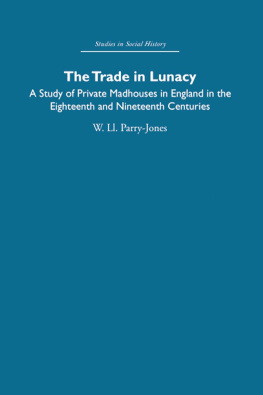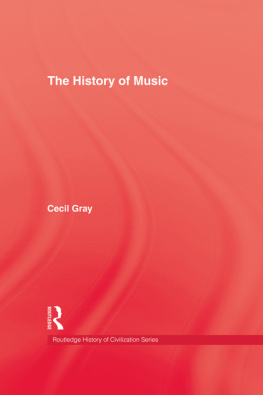First published in 1926
This edition published in 2007 by
Routledge
2 Park Square, Milton Park, Abingdon, Oxon, OX14 4RN
Routledge is an imprint of Taylor & Francis Group, an informa business
Transferred to Digital Printing 2010
1926 Dorothy Marshall
All rights reserved. No part of this book may be reprinted or reproduced or utilized in any form or by any electronic, mechanical, or other means, now known or hereafter invented, including photocopying and recording, or in any information storage or retrieval system, without permission in writing from the publishers.
The publishers have made every effort to contact authors and copyright holders of the works reprinted in the Studies in Social History series. This has not been possible in every case, however, and we would welcome correspondence from those individuals or organisations we have been unable to trace.
These reprints are taken from original copies of each book. In many cases the condition of these originals is not perfect. The publisher has gone to great lengths to ensure the quality of these reprints, but wishes to point out that certain characteristics of the original copies will, of necessity, be apparent in reprints thereof.
British Library Cataloguing in Publication Data
A CIP catalogue record for this book is available from the British Library
The English Poor in the Eighteenth Century
ISBN 10: 0-415-41289-7 (volume)
ISBN 10: 0-415-40266-2 (set)
ISBN 13: 978-0-415-41289-6 (volume)
ISBN 13: 978-0-415-40266-8 (set)
Routledge Library Editions: Studies in Social History
The English Poor
in
The Eighteenth Century
A Study in Social and Administrative History
BY
DOROTHY MARSHALL
M.A., PH.D. (CANTAB).
First Published 1926
by George Routledge & Sons Ltd
Reissued 1969
by Routledge and Kegan Paul Ltd
Broadway House, 6874 Carter Lane
London, E.C.4.
Printed in Great Britain by
Alden & Mowbray Ltd
at the Alden Press, Oxford
No part of this book may be reproduced in any form without permission from the publisher, except for the quotation of brief passages in criticism
SBN 7100 6421 7
CONTENTS
In eighteenth century England scope and activities of the Poor Laws were wider than they are todaythey had jurisdiction over a larger class of people and were expected to do more for themthis widespread influence assumed particular importance after the Restoration, because from that date England was entering on a career of social and industrial change. The 43 Eliz. c. 2 had been suited to the conditions of Tudor England, but by 1662 the parish was no longer a logical division of local government owing to the growth of trade and town life. Yet from 1662 to 1782 the outstanding mark of the administration of the Poor Laws was its intense parochialism. This was in direct contrast to the administration of the early Stuarts, who, through the Privy Council, had forced the parishes to attend to their statutory duties, and who had supervised the provision of adequate supplies of corn for the Poor. But after the Restoration this parental oversight vanished and was succeeded by a period of parochial laissez faire. Not only were the parishes responsible for the administration, but they also influenced the broad principles of the law. Yet in spite of the very considerable powers vested in the parish officers, the men chosen to serve these offices were untrained, unwilling, annual, and unpaid, so that the results of their activities were not happy, since both the community, as a whole, and the individual paupers were sacrificed to the need to save the parish harmless. The reason for this short-sighted policy is to be found in the need of each parish to keep its own rates down. Another result of leaving so much responsibility to the parish officer is to be found in the petty corruption that prevailed everywhere. Where the parish officers were disinclined to manage the Poor themselves, it was usual for them to enter into contracts with outside persons for this purpose. As a result of these abuses public opinion became disgusted with the parochial administration of the Poor, and after much discussion Gilbert's Act was passed in 1782, modifying the powers of the overseers and churchwardens. This Act marked a new stage in the public attitude towards the Poor, and so brought to an end the period of parochial laissez faire.
Influence of opinion on administration of the lawRelief of Poor deeply embedded in English social history. Motives : In Middle Ages religiousin Reformation and Tudor England political security and paternalismin Restoration religious motive fainter and changed in characterpaternalism resisted longer owing to economic conditionsas they improved attitude towards the Poor grew harder.
Writers classify Poor into: Old and impotentchildrenable-poor (crux of the situation)their number.
Causes of poverty: Decrease of tradelow wagesidleness extravagance and raised standard of livingGeneva drinking the Poor Law itself.
Suggested remedies: Stimulation of tradeencouragement of wool manufactureits disabilities-encouragement of linen manufacture. Methods of organising work: Giving out through clothierworking schoolsformation of joint-stock companies forcing the Poor to find work for themselvesworkhouses dissentient voices.
Gradual change of opinion: Dissatisfaction with administration of the workhousesnew suggestionsbeginnings of humanitarian movement in other directionsFrench influencefactors directing attention to the state of the Poorresulting growth of leniency.
The ceaseless activity shown by reformers in promulgating new schemes for the relief of the Poor is explained by the faults of the existing financial and administrative machinery of the parish. By the 43 Eliz. c. 2 the management of the Poor in each parish was entrusted to the overseers who were appointed annually and who were forced to serve or pay a fine. In practice the Justices exercised very little influence over them. Type of man chosen not suitableuntrainedunwillingalso economy not forced on themtherefore easy attitude towards expenditure and accountsin many parishes not noticeably corrupt but careless and inefficientand accounts neglected. But London parishes notoriously corrupt because the size of the out parishes offered more opportunities for peculation. Chief ways were by juggling with contractsby falsifying disbursements to the casual Poorby spending unnecessary amounts on parish feasts. Methods of collection were also open to suspicionno method of receipt. Abuse of communion money highly probable. By end of seventeenth century Parliament tried to provide some check on the parish officersthe 3 W. & M. c. II, followed by the 17 G. II. c. 3, which made the rate-books accessible to ratepayers. Sometimes individual vestries made efforts to control their officialswhile another method of improving the administration was to engage a paid assistant overseer. The money required by the overseers was raised by the Poor Rate. Difficult to estimate its amount at beginning of period because no statisticsforced to rely on contemporary statements until 1776. Between 1662 and 1782 rise noticeable both in country, as a whole, and in individual parishes. Increase fairly steady until the end of Charles II, then slow rise until the sixties, followed by sharp increase until end of the century. Amount paid by each parishioner fixed by overseers and churchwardens. Original intention seems to have been that each should pay in proportion to his abilitybut rents soon came to be considered as an indication of this abilityand eventually through a confusion of thought only the occupier and not the owner was taxed. The rule that the Poor's tax should be based on equal pound rate not universaltraces of ability to payassessments on Land Tax booksStock-in-trade.






